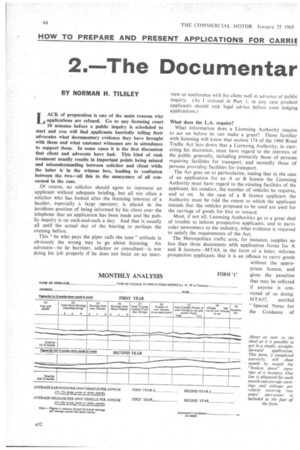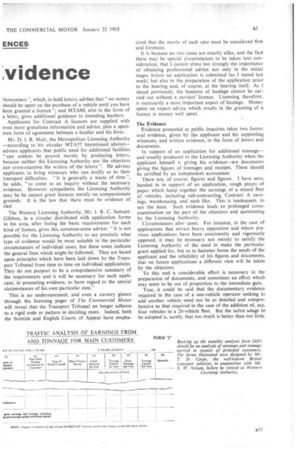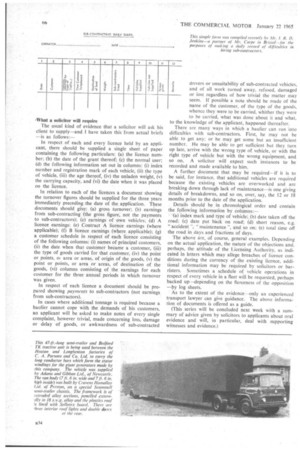2. The Documentar
Page 66

Page 67

Page 68

If you've noticed an error in this article please click here to report it so we can fix it.
ividence
BY NORMAN H. TILSLEY 11ACK of preparation is one of the main reasons why applications are refused. Go to any licensing court 10 minutes before a public inquiry is scheduled to start and you will find applicants hurriedly telling their advocates what documentary evidence they have brought with them and what customer witnesses are in attendance to support them. In some cases it is the first discussion that client and advocate have had. This kind of rush treatment usually results in important points being missed and misunderstanding between solicitor and client while the latter is in the witness box, leading to confusion between the two—all this to the annoyance of all concerned in the case.
Of course, no solicitor should agree to represent an applicant without adequate briefing, but all too often a solicitor who has looked after the licensing interests of a haulier, especially a large operator, is placed in the invidious position of being informed by his client over the telephone that an application has been made and the public inquiry is on such-and-such a day. And that is usually all until the actual day of the hearing or perhaps the evening before.
This "he who pays the piper calls the tune" attitude is obviously the wrong way to go about licensing. An advocate—be he barrister, solicitor or consultant—is not doing his job properly if he does not insist on an inter view or conference with his client well in advance of public inquiry. (As I stressed in Part 1, in any case prudent applicants should seek legal advice before even lodging applications.) What does the L.A. require?
What information does a Licensing Authority require to act on before he can make a grant? Those familiar with licensing will know that section 174 of the 1960 Road Traffic Act lays down that a Licensing Authority, in exercising his discretion, must have regard to the interests of the public generally, including primarily .those of persons requiring facilities for transport, and secondly those of persons providing facilities for transport.
The Act goes on to particularize, stating that in the case of an application for an A or B licence the Licensing Authority must have regard to the existing facilities of the applicant, his conduct, the number of vehicles he requires, and so on. In the case of a B licence applicant the Authority must be told the extent to which the applicant intends that the vehicles proposed to be used are used for the carriage of goods for hire or reward.
Most, if not all, Licensing Authorities go to a great deal of trouble to inform prospective applicants, and in particular newcomers to the industry, what evidence is required to satisfy the requirements of the Act.
The Metropolitan traffic area, for instance, supplies no less than three documents with application forms for A and B licences—MTA9, in the form of a letter, informs prospective applicants that it is an offence to carry goods without the appro priate licence, and FORM '1' gives the penalties that may be inflicted if anyone is convicted of so doing; MTA57, entitled "Special Notes for the Guidance of
,lewcomers ", which, in bold letters, advises that " no money should be spent on the purchase of a vehicle until you have been granted a licence "; and MTA80, also in the form of a letter, gives additional guidance to intending hauliers.
Applicants for Contract A licences are supplied with even more gratuitous information and advice, plus a specimen form of agreement between a haulier and his hirer.
Mr. D. I. R. Muir, the Metropolitan Licensing Authority —according to his circular MTA57 (mentioned above)— advises applicants that public need for additional facilities
can seldom be proved merely by producing letters, because neither the Licensing Authority nor the objectors can cross-examine the writers of the letters ". He advises applicants to bring witnesses who can testify as to their transport difficulties. "It is generally a waste of time ", he adds, "to come to an inquiry without the necessary evidence. However sympathetic the Licensing Authority may be he cannot grant licences merely on compassionate grounds. It is the law that there must be evidence of ried The Western Licensing Authority, Mr. J. R. C. SamuelGibbon, in a circular distributed with application forms in his area, after listing the basic requirements for each kind of licence, gives this common-sense advice: " It is not possible for the Licensing Authority to say precisely what type of evidence would be most suitable in the particular circumstances of individual cases, but these notes indicate the general lines which might be followed. They are based upon principles which have been laid down by the Transport Tribunal from time to time on individual applications. They do not purport to be a comprehensive summary of the requirements and it will be necessary for each applicant, in presenting evidence, to have regard to the special circumstances of his own particular case."
This is no understatement, and even a cursory glance through the licensing pages of The Commercial Motor will reveal that the Transport Tribunal no longer adheres to a rigid code or pattern in deciding cases. Indeed, both the Scottish and English Courts of Appeal have empha
sized that the merits of each case must be considered first and foremost.
It is because no two cases are exactly alike, and the fact there may be special circumstances to be taken into consideration, that I cannot stress too strongly the importance of obtaining professional advice not only in the initial stages before an application is submitted (as I stated last week) but also in the preparation of the application prior to the hearing and, of course, at the hearing itself. As I stated previously, the business of haulage cannot be carried out without a carriers' licence. Licensing, therefore, is necessarily a most important aspect of haulage. Money spent on expert advice which results in the granting of a licence is money well spent.
The Evidence Evidence presented at public inquiries takes two forms: oral evidence, given by the applicant and his supporting witnesses, and written evidence, in the form of letters and documents.
In support of an application for additional tonnage— and usually produced to the Licensing Authority when the applicant himself is giving his evidence—are documents giving the figures of tonnages and receipts. These should be certified by an independent accountant.
There are, of course, figures and figures. I have seen, handed in in support of an application, rough pieces of paper which lump together the earnings of a mixed fleet of vehicles, including sub-contracting, Contract A earnings, warehousing, and such like. This is inadequate, to say the least. Such evidence leads to prolonged crossexamination on the part of the objectors and questioning by the Licensing Authority.
Circumstances alter cases. For instance, in the case of applications that attract heavy opposition and where previous applications have been consistently and vigorously opposed, it may be necessary not merely to satisfy the Licensing Authority of the need to make the particular grant applied for, but so to hammer home the needs of the applicant and the reliability of his figures and documents, that on future applications a different view will be taken by the objectors.
To this end a considerable effort is necessary in the preparation of documents, and sometimes an effort which may seem to be out of proportion to the immediate gain.
True, it could be said that the documentary evidence required in the case of a one-vehicle operator seeking to add another vehicle need not be as detailed and comprehensive as that required in the case of the addition of, say, four vehicles in a 20-vehicle fleet. But the safest adage to be adopted is, surely, that too much is better than too little.
'What a solicitor will require
The usual kind of evidence that a solicitor will ask his client to supply—and I have taken this from actual briefs —is as follows:—
In respect of each and every licence held by an applicant, there should be supplied a single sheet of paper containing the following particulars: (a) the licence number; (b) the date of the grant thereof; (c) the normal user; (d) the following information set out in columns: (i) index number and registration mark of each vehicle, (ii) the type of vehicle, (iii) the age thereof, (iv) the unladen weight, (v) the carrying capacity, and (vi) the date when it was placed on the licence.
In relation to each of the licences a document showing the turnover figures should be supplied for the three years immediately preceding the date of the application. These documents should give: (a) gross turnover: (13) earnings from sub-contracting (the gross figure, not the payments to sub-contractors); (c) earnings of own vehicles; (d) A licence earnings; (e) Contract A licence earnings (where applicable); (f) B licence earnings (where applicable); (g) a customer schedule in respect of each licence consisting of the following columns: (i) names of principal customers, (ii) the date when that customer became a customer, (iii) the type of goods carried for that customer, (iv) the point or points, el area or areas, of origin of the goods, (v) the point or points, or area or areas, of destination of the goods, (vi) columns consisting of the earnings for each customer for the three annual periods in which turnover was given.
In respect of each licence a document should be prepared showing payments to sub-contractors (not earnings from sub-contractors).
In cases where additional tonnage is required because a haulier cannot cope with the demands of his customers, an applicant will be asked to make notes of every single complaint, however trivial, made concerning loss, damage or delay of goods, or awkwardness of sub-contracted .1
2 &
drivers or unsuitability of sub-contracted vehicles, and of all work turned away, refused, damaged or lost regardless of how trivial the matter may seem. If possible a note should be made of the name of the customer, of the type of the goods, whence they were to be carried, whither they were to be carried, what was done about it and what, to the knowledge of the applicant, happened thereafter.
There are many ways in which a haulier can run into difficulties with sub-contractors. First, he may not be able to get any; or he may get some but an insufficient number. He may be able to get sufficient but they turn up late, arrive with the wrong type of vehicle, or with the right type of vehicle but with the wrong equipment, and so on. A solicitor will expect such instances to be recorded and made available to him.
A further document that may be required—if it is to be said, for instance, that additional vehicles are required because the existing vehicles are overworked and are breaking down through lack of maintenance—is one giving details of breakdowns, and so on, over, say, the 12 or 18 months prior to the date of the application.
Details should be in chronological order and contain the following information by columns:— • (a) index mark and type of vehicle (b) date taken off the road; (c) date put back on road; (d) short reason. e.g. "accident ", " maintenance ", and so on; (e) total time off the road in days and fractions -of days.
The above are, of course, general examples. Depending on the actual application, the nature of the objections and. perhaps, the attitude of the Licensing Authority, as indicated in letters which may allege breaches of licence conditions during the currency of the existing licence, additional information may be required by solicitors or barristers. Sometimes a schedule of vehicle operations in respect of every vehicle in a fleet will be requested, perhaps backed up--depending on the fierceness of the opposition —by log sheets.
As to the extent of the evidence—only an experienced transport lawyer can give guidance. The above information of documents is offered as a guide.
(This series will be concluded next week with a summary of advice given by solicitors to applicants about oral evidence and will, in particular, deal with supporting. witnesses and evidence.)




















































































































